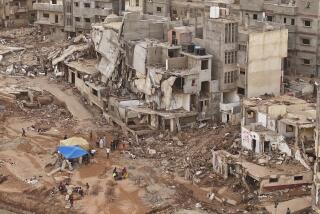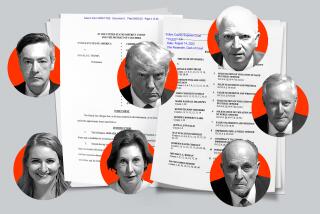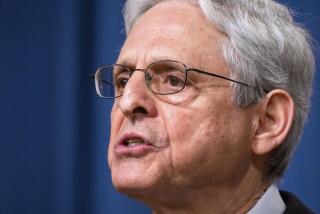Libya Implicated in Pan Am Bomb Indictments
- Share via
WASHINGTON — In charges that directly implicate the Libyan government, authorities announced the indictment Thursday of two Libyan intelligence operatives here and in Scotland for the Dec. 21, 1988, bombing of Pan American Flight 103.
The White House said it is considering “any number of international responses,” but an official, insisting on anonymity, ruled out any immediate military action.
The charges do not officially list as defendants Libya or its intelligence service. But both are believed to have played central roles in blowing up the London-to-New York flight, killing 259 passengers and crew members and 11 people on the ground in Lockerbie, Scotland.
But the senior Justice Department official in charge of the investigation emphasized that the bombing was not a rogue operation and that the indictment details a major international terrorist ring being run by the Libyans.
White House and State Department spokesmen turned the legal action into a broad political indictment of the Libyan government of Moammar Kadafi, branding it a terrorist regime and declaring that it must be deterred.
The indictment, returned by a federal grand jury here Wednesday under seal, charged with 193 criminal counts the two Libyans: Abdel Basset Ali Megrahi, chief of the intelligence service unit that oversaw covert operations under the cover of Libya’s national airline; and Lamen Khalifa Fhimah, station manager for the airline at a Malta airport.
Three of the five U.S. federal laws that the Libyans are accused of violating carry the death penalty, while sentences in the others range from five years to life in prison. The United States has no extradition treaty with Libya, and Robert S. Mueller III, head of the Justice Department’s criminal division, indicated that the indictment was unsealed because there is no expectation of immediately apprehending the two.
Acting Atty. Gen. William P. Barr said that the investigation is continuing and “will be pursued unrelentingly until all responsible are brought to justice.” He declared that the indictment “sends a powerful message: We have the resolve and the ability to track down--no matter how long it takes--those responsible for terrorist acts against Americans.”
Ali Ahmed Elhouderi, Libyan ambassador to the United Nations, denied any involvement by his country in the bombing and dismissed the indictment as “nonsense.” He contended that “the United States is taking measures against Libya without having any proof.”
The leader of a group of relatives of some Pan Am bombing victims called for military retaliation against Libya, while other relatives said they still suspect that Syria and Iran were involved in the bombing. But Mueller said there is no evidence to link either country to the bombing, and he brushed aside suggestions that the conclusion had been influenced by the United States’ desire for improved relations with Syria.
President Bush, speaking to a group of Latino educators, went further than Mueller, saying: “A lot of people thought it was Syrians. The Syrians took a bum rap on this.” Bush praised the “very good work” that led to the charges and said they were not “some quick hit, quick fix on trying to find the answer.” The charges were announced 1,059 days after the Pan Am plane went down.
The Syrians initially emerged as prime suspects partly because the investigation team first focused on the Popular Front for the Liberation of Palestine-General Command, a Syrian-backed terrorist organization. A German cell of the group appeared to have been planning a similar attack on a U.S. airline in retaliation for the accidental 1988 downing of an Iranian Airbus by the U.S. guided missile cruiser Vincennes in the Persian Gulf; 290 died in that incident.
The Syrian-backed group was thought to have been commissioned by the Iranian government to carry out the retaliation. But that plot was cut off, U.S. sources said, when German police penetrated the cell and arrested some of the plotters in October, 1988.
Mueller and Assistant FBI Director William M. Baker declined Thursday to discuss possible Libyan motivation for the Pan Am bombing, noting that the indictment includes no such explanation. But U.S. authorities previously have suggested that the Kadafi regime carried out the Pan Am bombing in revenge for the 1986 U.S. bombing of Tripoli. About 40 people, including Kadafi’s adopted daughter, were killed in that air assault.
The indictment traces the origins of the Pan Am bombing to the summer of 1985, when an official of the Libyan intelligence service, Jamahiriya Security Organization, asked Edwin Bollier of the Swiss firm of Meister et Bollier to develop 20 timers.
The sophisticated timers were described as “prototype digital electric timers, Model MST-13, capable of initiating . . . an explosion at a predetermined time.” They were obtained by Izzel Din Hinshiri, Libya’s former minister of justice who now serves as minister of transportation, according to the charges.
The indictment charges that in 1988, Jamahiriya issued plastic explosives, blasting caps and detonators and the digital timers to “JSO operatives who engaged in covert terrorist operations outside of Libya, including in the Republic of Senegal.”
Around the summer of 1988, Fhimah stored some of the plastic explosive in his office at the Libyan Arab Airlines station at the Luqa airport in Malta. He and Megrahi allegedly constructed an “improvised explosive device” of plastic explosives and the digital timer, concealing it inside a Toshiba portable radio cassette player and placing it in a Samsonite suitcase.
On Dec. 7, 1988, Megrahi bought clothing at Mary’s House, a Malta store near the hotel where he was staying, to be packed in the suitcase with the radio “to provide the appearance of a normal travel bag,” the indictment said.
On Dec. 15, 1988, it said, Fhimah wrote a reminder in his desk diary to take baggage tags from Air Malta to give to Megrahi.
The tags, along with the defendants’ knowledge and access gained as a result of their employment with Libyan Arab Airlines, allowed them to evade Maltese customs and airline security. The defendants managed to place the suitcase containing the bomb “in the stream of international airline passenger luggage” being loaded aboard outgoing flights.
The suitcase was placed aboard an Air Malta flight to Frankfurt Airport in Germany, where it was transferred to Pam Am Flight 103A, which flew to London. There, the suitcase was transferred to Pan Am Flight 103, the indictment alleged.
In saying that any immediate military response is unlikely, the White House official said the Bush Administration prefers to wait to see how Libya reacts to the charges. “It may serve Kadafi’s purposes to cooperate,” the White House source said. “Nobody knows at this point.”
He said the United States is preparing to relay official notification of the indictments through Belgium, which serves as its diplomatic liaison with Libya. There are no formal U.S.-Libyan diplomatic relations.
A primary consideration against immediate military response, the official said, is the diplomatic storm likely to arise if U.S. bombers strike Libya before Kadafi has had a chance to respond or before it is clear that the defendants are in Libya and will not be turned over to U.S. or British authorities.
The White House official also indicated that Bush has held at least preliminary discussions over future actions with allied leaders he met in one-on-one sessions during a North Atlantic Treaty Organization meeting in Rome last week.
In Britain, Foreign Secretary Douglas Hurd told Parliament on Thursday that the British government expects Libya to “respond fully” to a formal demand for the surrender of the Libyan suspects.
“This was a fiendish act of wickedness and it cannot be passed over or ignored,” he said. “The accusations leveled at Libyan officials are of the gravest possible kind. This is mass murder, which is alleged to involve the organs of government of a state.”
Times staff writers James Gerstenzang, Doyle McManus and Robin Wright in Washington and William Tuohy in London contributed to this report.
More to Read
Sign up for Essential California
The most important California stories and recommendations in your inbox every morning.
You may occasionally receive promotional content from the Los Angeles Times.













